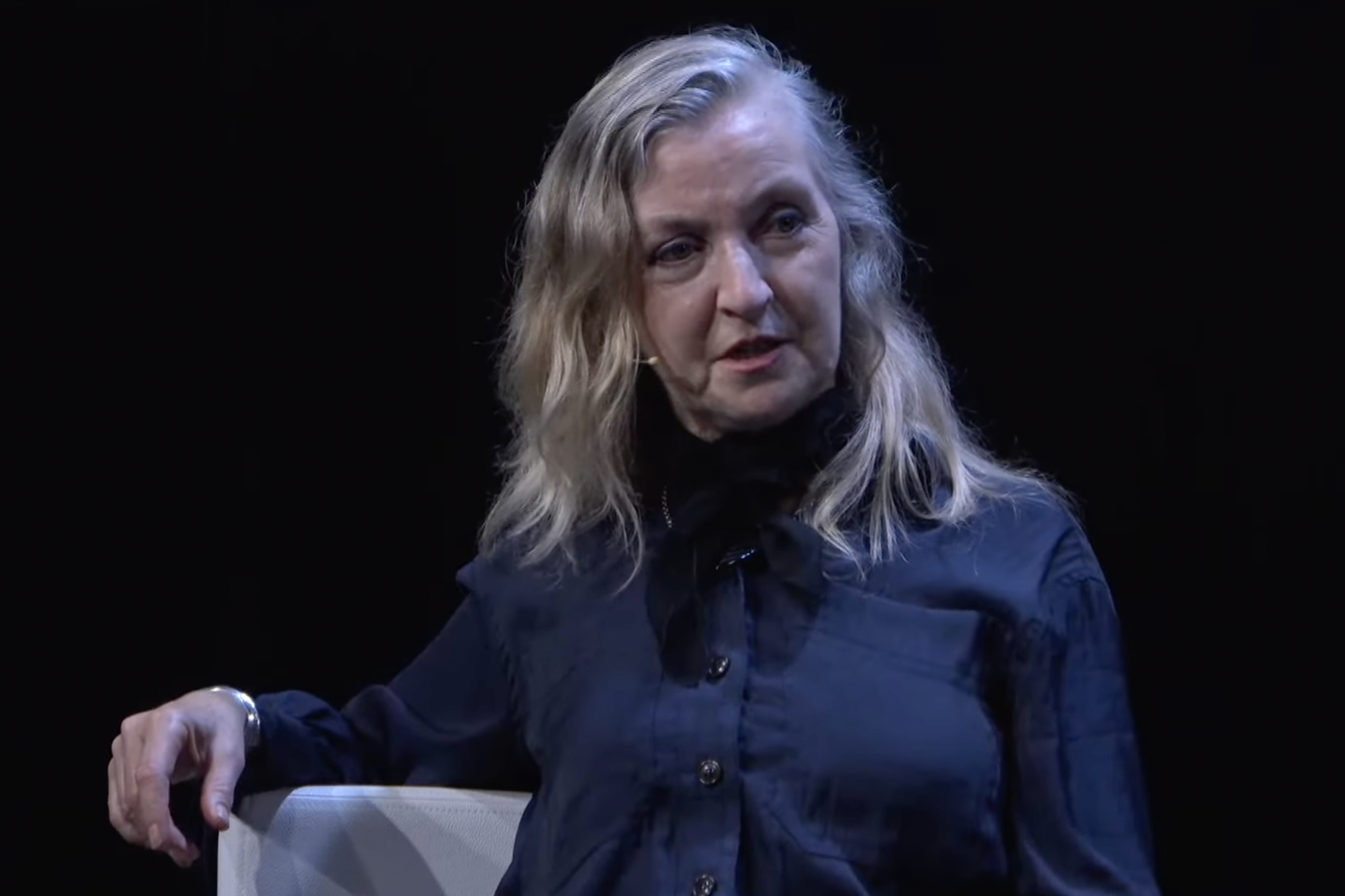ARTICLE AD BOX
“You become prolific by being the sort of nerdy person who stays home alone more than most people could stand, so just keep that in mind,” Rebecca Solnit says kindly when I say that prepping for a conversation with her is an intimidating task. The 63-year-old non-fiction giant and activist is not just intellectually rigorous and deeply researched on activism, feminism, climate change, urbanisation and politics, but inexhaustible; only a serious Solnit lover could keep up.
We’re speaking ahead of her appearance at Hay Festival and the release of No Straight Road Takes You There, her 28th book. This is a figure I have to double-check with her over email, and even in that count, she has chosen to exclude some smaller books.
A dodgy internet connection means that the glimpse I get of Solnit, with her unchanging wavy mass of hair and huge almond eyes behind glasses, is brief. She’s sitting in a well-lit room in her house in San Francisco, a city she’s lived in for almost her whole life, when we switch to audio only. This only serves to highlight the fact that she speaks – with a gorgeously soft, somniferous voice – much the same way she writes: in long, gentle paragraphs that take the scenic route.
Solnit grew up in the Bay Area in the 1970s, a self-described unpopular, nerdy kid. She had a difficult childhood, raised by her Jewish father and Irish Catholic mother. Her father was an urban planner, whose preservationist “or at least anti-sprawl” stance you could imagine would’ve had a hand in steering her early politics on cities and climate, though, she says, this lineage is more of a coincidence than an influence.
“He didn’t talk about his work and died when I was 25, and was, to put it in the most delicate terms, a very difficult person. So, there wasn’t a lot of unpacking of what he did,” Solnit recalls. “I feel like, in a way, the cities themselves taught me. I ran off to Paris when I was 17 and I’ve been in San Francisco since I was 18.”
Her writing style, a meandering mix of the personal, the cultural and the journalistic, was born at the same time as her politics. As a young woman in the Eighties, she joined her younger brother, an avid anti-nuclear activist, at protests at the Nevada Test Site, where over a thousand nuclear bombs were detonated at the expense of people, wildlife and the environment. Her related activism led her to meet nuclear downwinders, atomic veterans, Hiroshima survivors and nuclear physicists: people who’d had front row seats to the destruction. “There were so many layers, so many convergences there, I realised I needed all those styles to unpack what was going on,” she explains. “I could desegregate them, weave them all together, and that’s how I arrived at the way I still write.”

Rarely in her work does Solnit provide answers or give predictions, even less frequently does she use tools of the hyperbolic or persuasive writer. In this latest book, then, I was surprised to see an essay about how we should stop propagating the idea that we should meet the right wing in the middle and get to understand them, in part because they are often not even dealing with facts, just delusion. In her words: “Who the hell wants unity with Nazis until and unless they stop being Nazis?”
Instead, she typically writes in loops like a plane in a holding pattern; instead of her arguments landing, she hands the reader a parachute, preferring to remind us we have the freedom and autonomy to risk having hope. This style is utterly alien to the writing surrounding us today, from Netflix screenplays written for the broadest global audience possible to didactic Instagram captions and essayists barking online.
Does she have the sense that she is at odds with the culture? “Absolutely. There’s a sentence attributed to Einstein in my second book Savage Dreams, that I’ve gone back to again and again: everything should be as simple as possible but not simpler,” she says. “People often want these explanations of the world around us that are simpler than the reality itself, that are easy to grasp, easy to repeat, and often casting what is nuanced in much more absolute terms.”
Jew is not a political category. There are pro-Palestinian Jews, there are ultra-Zionist Jews and everything in between
Rebecca Solnit
Categories are leaky, and we’d do well to remember that, she adds. “I was just having a conversation with someone about the fact that Jew is not a political category. There are pro-Palestinian Jews, there are ultra-Zionist Jews and everything in between. The desire to have these simplistic versions of reality, these certainties about the future, doesn’t serve us in any way except bolstering our own ability to make flat, bold statements, which I think is a bit overrated anyway.”
In No Straight Road Takes You There, Solnit celebrates slow victories and the ability to see the bigger picture, even when it looks as though we’re losing (politically, personally). In her world, the certainty of pessimism only feels better because it lets us off the hook of taking action.
“What’s been striking about the climate crisis is that people I know who are deeply involved as scientists and activists do not think that the world is going to end,” she says. “Most of them are not afraid to have children and quite a lot have in recent years. They’re not doomers, they know the situation is tremendously grim, but there’s lots we can do, lots we have already done. And there’s a strange thing with climate specifically, where people on the peripheries often give up.”
Solnit frequently finds hope in small milestones of progression. For instance, in the UK, the last coal-fired plant was closed in September. Even when those milestones are temporarily reversed, there’s often a positive outlook to be had. On British trans-exclusionary feminism, she implies that what we’re seeing is partly a backlash against gains for trans people, “which is a reminder that there has been that profound change”.
It’s only ever the end of the world for those with limited imaginations. “The future does not depend on what we can imagine,” she says, taking on an accidental David Attenborough gravitas. “It often exceeds our imagination in both wonderful and terrible ways. Preparing to meet it is partly accepting the sheer unpredictability of it and partly in being ready to meet and participate in what arises.”
Unsurprisingly, as someone who has claimed the essay form and stayed loyal to non-fiction, she believes that the latter is as important as ever in a post-truth, AI-generated age. “Non-fiction is like the term non-white. It is defined in relation to fiction, which I don’t think really deserves its elevated centrality,” she says. It’s in non-fiction that Solnit takes current affairs that feel weighty and too complicated for the average reader and distils them into a faithful 2,000-word essay. “There’s a way that men write big books because big is important, but I see a lot of books that would be better if they were much shorter,” she adds.
No, non-fiction is important because it has a real-world impact in public life that even the best fiction cannot have, she thinks. “Fictional heroes are very different from real heroes,” she says, “I like that weight, that consequence, that way that non-fiction can participate in and can change the world.” Of course, like every writer she had once wanted to write fiction (and has since written a couple of reimagined fairy tales), “but it was always annoying to me as a young writer that people assume that the ultimate goal is to write fiction, that somehow you’re climbing the ladder and the top rung is fiction. I have a little grudge because fiction was always treated as the most important, the most literary, the aspirational goal… F*** that”.
While she loves the Italian author Elena Ferrante, whose protagonists are deeply woven in with questions of class, gender and politics, she judges many novels as facile, perhaps even narcissistic: “A lot of American novelists I find very depoliticizing, almost in ways that make me feel like I’m standing next to someone at a party who’s telling me about their personal problems and not about their ideas or their political commitments, et cetera.”
Many women still discover Solnit through her popular 2017 essay-turned-book, The Mother of All Questions. Using her own experiences as a jumping-off point, Solnit asks why women are always questioned as to whether they have children – or whether they want them. Instead, Solnit posits that there’s so much else in the world that needs women’s love above children, hypothetical or otherwise. I ask her what she thinks about the current discourse around the falling birth rate. Now that having a child has become a luxury lifestyle, what does that do to the mother of all questions? “What would make women want to have children is the kind of stuff a lot of Scandinavian women have, which is the sense of support and security you have in those economies: a real social welfare state,” Solnit says, adding that she sympathises with the dire economic situation young women today face.
There are a lot of dumb new age ideas: everything happens for a reason. You create your own reality. We have full control over what happens
Rebecca Solnit
Her work is, I think, deeply soul-enriching, erring on the spiritual, like a more literary Pema Chödron. It’s a descriptor Solnit doesn’t find off-putting; rather, she thanks me for it and adds that she believes the way we crave meaning and purpose and membership in civil society is actually spiritual. “It’s true that what we often see [as] the spiritual is our most interior life, the political is our most exterior public life. But I think that interior life gives us the moral convictions we exercise in politics, that politics often can have that,” she says. “I’ve seen the exhilaration, the profundity of people in mass movements discovering something in themselves and the people around them that they might not have believed in before. I’ve seen people just light up with joy describing who they and the people around them were in disasters.”
Offhandedly, she says she doesn’t like “woo” or new age spirituality, so I ask her to explain. Well, there’s the appropriation of other people’s spiritual traditions, she says, not to mention the shallowness to it. But most of all, there’s the problematic New Age thinking, which falls into the absolutism she was critiquing earlier. “There are a lot of dumb new age ideas: everything happens for a reason. You create your own reality. We have full control over what happens. I just saw a friend of mine, who’s otherwise wonderful, post a dumb thing by Joseph Campbell that suggested everything is a wonderful experience. You know: all the bad things that happen to us are experiences we can learn from.”
You can imagine the tragic global geopolitical situations she lists next are not learning experiences. “Not all experiences are wonderful, meaningful things. The idea that somehow we choose our experiences to learn from them in some spiritual way doesn’t address slavery and genocide. So, it’s glib and superficial. It often oversimplifies.” She tops this off with a story about when she saw a group of hapless New Agers performing a ceremony in honour of the four cardinal directions. They didn’t even know their North from their South.
She laughs gently at this, and says, so sweetly that you would never believe it was true if it didn’t come after her eloquent rant, “Opinions, get them here, hot and cold.” The next day, over email, presumably at home alone, she writes to me that all this spiritual talk has given her an idea for a new essay.









 English (US) ·
English (US) ·